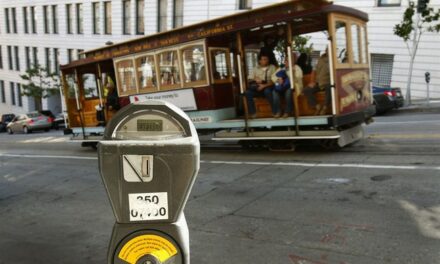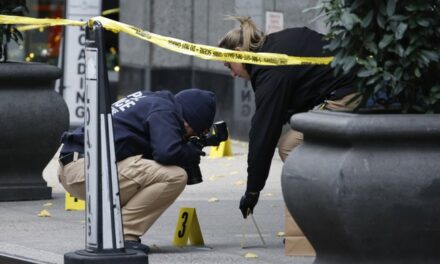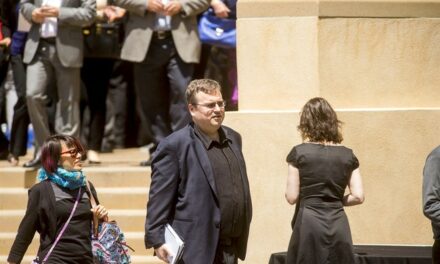We support our Publishers and Content Creators. You can view this story on their website by CLICKING HERE.

Note: I am (mostly) on vacation this week and will return on Tuesday. Please enjoy this reflection from 2018; I also have reflections from 2015 and 2021 on these passages. I will have a new Sunday reflection next weekend.
Advertisement
This morning’s Gospel reading is Luke 3:1–6:
In the fifteenth year of the reign of Tiberius Caesar, when Pontius Pilate was governor of Judea, and Herod was tetrarch of Galilee, and his brother Philip tetrarch of the region of Ituraea and Trachonitis, and Lysanias was tetrarch of Abilene, during the high priesthood of Annas and Caiaphas, the word of God came to John the son of Zechariah in the desert. John went throughout the whole region of the Jordan, proclaiming a baptism of repentance for the forgiveness of sins, as it is written in the book of the words of the prophet Isaiah: A voice of one crying out in the desert: “Prepare the way of the Lord, make straight his paths. Every valley shall be filled and every mountain and hill shall be made low. The winding roads shall be made straight, and the rough ways made smooth, and all flesh shall see the salvation of God.”
“Be prepared,” the brilliant satirist Tom Lehrer sang, “that’s the Boy Scouts’ marching song.” Granted, the rest of the song is hardly a theological foundation for Advent, as anyone who’s listened to Lehrer before could guess even without hearing it. It’s a funny goof on scouting and on the life that scouts might encounter not long after their days in the group are over. An even more ominous song of the same title comes from Disney’s The Lion King, in which the evil Scar plots the assassination of his brother the king. In the film, the performance comes complete with an allusion to Leni Riefenstahl’s propaganda. Yeesh.
Advertisement
If you have to choose between the two Be Prepareds, go with Lehrer’s version. You’re welcome.
Basically, we prepare for many things in life, with many different purposes and ends. Most of our preparations are not of Scar’s variety, of course, but for much more mundane tasks. We prepare food for dinner as a routine matter; we prepare our taxes ahead of time to ensure compliance. We make plans to meet with friends and family, we put in reservations for flights, and we often plan our children’s spare time to the minute to ensure that they have no spare time at all.
We don’t always put effort into preparation. Sometimes we dispense with preparation altogether in order to enjoy the extemporaneous approach. Most often, we procrastinate, or at least I do, as my wife can tell you in chapter and verse. Rather than prepare properly, we put it off to the last minute and then rush to cover for our own failures. The result is often a mediocre effort, with misunderstandings and new problems that require even more effort to resolve.
And so it is with people of God. The entire arc of salvation can be encapsulated in those two words: Be prepared. When Adam and Eve left Eden after their rebellion, God told them to prepare themselves and their descendants to do battle with the serpent. When Moses led Israel out of Egypt, the Lord gave them the Ten Commandments by which to live in order to prepare themselves to be a nation of priests in the Promised Land. The prophets existed to tell the Israelites to prepare themselves for disaster if they did not put their trust in the Lord, lessons which the Israelites learned the hard way over and over again.
Advertisement
Today’s readings emphasize preparation as we begin our Advent season, but in this context to prepare ourselves for joy in the Lord. In the midst of the Babylonian siege of Jerusalem, Baruch tells the city to shed “your robe of mourning and misery,” and to “put on the splendor of glory from God forever.” As the city was falling and the first temple doomed to destruction, Baruch reminded Jerusalem that “God is leading Israel in joy by the light of his glory,” regardless of what might be happening in the moment. The people of Judah needed to prepare themselves to remain faithful to the Lord even in their tribulation, and if they did, the Lord would lead them out of the darkness and into glory — which happened 70 years later.
By the time of our Gospel reading, the Israelites had fallen back into darkness, this time from the Roman occupation. John, the cousin of Jesus, went into the desert region around the Jordan River performing baptisms and prophesying the coming of the Messiah. The baptisms themselves were a form of preparation, of cleansing sin to prepare to greet the Son of God when He came. John the Baptist quoted both Isaiah and Baruch in urging people to prepare themselves for His coming:
“Prepare the way of the Lord, make straight his paths. Every valley shall be filled and every mountain and hill shall be made low. The winding roads shall be made straight, and the rough ways made smooth, and all flesh shall see the salvation of God.”
Advertisement
John’s call rings out to this day. “Be Prepared” is not just the Boy Scouts’ marching song; it’s the marching song of Christians everywhere. The season of Advent reminds us of the anticipation of the coming of the Messiah, but it also reminds us to prepare ourselves — ourselves — for His arrival. It is intended to give us the same urgency as John the Baptist communicated to the Israelites in the desert, the same way that Moses urged his flock to prepare themselves by receiving the Ten Commandments in their hearts. The time is now, not some distant moment which we can safely put off and procrastinate in our preparations. And this is not about preparing a meal, or a play date, or financial matters. It’s about forming ourselves to the will of the Lord, as Christ Himself exemplified, and putting aside all of the temptations that distract us from that purpose.
And as Baruch instructs us, that preparation should come in joy and total commitment, as we trust in the Lord to deliver us to salvation. If you’re looking for a song to get you in the mood, Godspell’s “Prepare Ye” might be your best bet. Although I do like me some Lehrer, too …
The front-page image is The front-page image is “The Preaching of St. John the Baptist in the Desert” by Massimo Stanzione, c. 1634. On display at the Museo del Prado in Madrid, Spain. Via Wikimedia Commons.
Advertisement
“Sunday Reflection” is a regular feature, looking at the specific readings used in today’s Mass in Catholic parishes around the world. The reflection represents only my own point of view, intended to help prepare myself for the Lord’s day and perhaps spark a meaningful discussion. Previous Sunday Reflections from the main page can be found here. For previous Green Room entries, click here.

 Conservative
Conservative  Search
Search Trending
Trending Current News
Current News 







